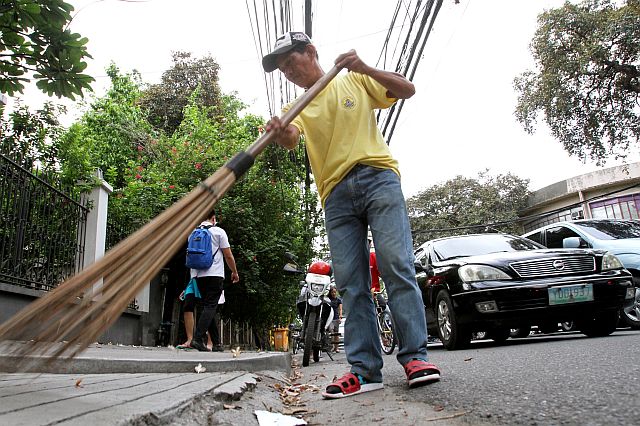
Eduardo Opinio, 50, a street sweeper, fears losing his job of 16 years as he is among the 3,400 Cebu City casual employees whose employment contract might not be renewed after June 30. (CDN PHOTO/JUNJIE MENDOZA)
Cebu City may be left with a few traffic enforcers or street cleaners starting on July 1 when the service contracts of about 3,413 casual employees of the city government will end.
The casual employees were advised yesterday to stop reporting for work after their contracts end on June 30 via a memorandum issued by Acting City Administrator Veronica Morelos.
Among them are about 350 traffic enforcers and parking attendants under the Transportation Office (CCTO) and another 200 street cleaners under the Department of Public Services (DPS).
While there was an assurance from City Hall officials that those engaged in basic services would be rehired, it was not known how many would get their jobs back.
“All heads of department and/or in-charge of office are hereby advised to inform all casual employees under your respective department or office not to report effective July 1, 2016 unless a Notice of Renewal of Appointment be issued,” stated the memorandum.
Eduard Opinia , 50, has been a street cleaner in Cebu City for 16 years. He goes back and forth the busy Ramos Street from 1 p.m. to 8 p.m. to keep it clean.
Opinia has thought he has a secured job even if he was only a casual employee. But yesterday, he got scared. By July 1, he might no longer have the job that has been sustaining his family.
He said that he would not know how he could still be able to send his two children to school – a 12-year-old daughter in high school and another in college – if he would lose his job.
“Hangyo lang usab ko nga maytag magpabilin ta. Nagtinarung man sad tag trabaho. Pero kung mao man gani na, wala na gyud tay mahimo. Iampo nalang nato ni (Please let me keep my job. I’m doing my job the best I could. But if I will be among those who would be fired, there is nothing I can do about it except to pray for God’s guidance),” he said.
DPS Head John Paul Gelasque said his department could not afford to lose all the 213 metro aids, including garbage collectors and drivers that are all casual employees, and was confident he would be able to get most of them rehired.
“We need warm physical bodies for our department to function. Dili pwede i-relieve ang tanan. Mabiyaan rana kausa ang dalan the next day pwerte nang hugawa sa dalan (We cannot relieve all of them. You abandon the streets for just a day and it becomes a mess the next day). We cannot afford to see our streets like that,” he said.
Morelos said the casual workers could reapply but rehiring them would be subject to the evaluation and approval of incoming Mayor Tomas Osmeña, who would also assume office on June 30.
Acting Mayor Margarita “Margot” Osmeña, the wife of the incoming mayor, however, assured not all the casual employees would have to vacate their posts by July 1.
“They are not all going to disappear, I would worry about that too,” she told Cebu Daily News.
She said that contracts that would end on June 30 could be renewed the next day to ensure that there would no interruptions in the delivery of the city’s services to the public.
CCTO Head Rafael Yap said his unit only has five regular employees, all section heads, but he remained hopeful that he would not be left without a single personnel to man traffic on July 1.
As office head, Yap said he only needed to justify the need to rehire existing employees or push for the hiring of replacements for those who would no longer be rehired.
City hall employs a casual worker for a period of six months. Their employment contracts may be renewed for another six months if they pass the performance evaluation of their office heads and the Human Resources and Development Office (HRDO). Acting HRDO Head Marie Velle Abella said that as of March 2016, the city has 3,413 casual employees.
She said she would not know how many casual workers would be rehired by Osmeña, but the department heads and officers-in-charge met everyday to submit personnel inventory since this would be the basis for reappointment.
A City Hall source said that Morellos already met with some department and office heads to show them a list of casual employees who could be rehired after the June 30 expiration of their employment contracts. The department heads were given the prerogative to push for the rehiring of some casuals whom they wanted to retain.
Yap, who was in Manila when CDN called him yesterday afternoon, said he has yet to see Morellos’ memorandum and expressed worry over what would happen to traffic management if CCTO is left without casual employees on July 1.
CCTO has more than 500 personnel. Only five of them – the heads of the planning, engineering, operations, education and special operations units – are regular employees.
All the rest are casual employees. These include the at least 250 traffic enforcers, about a 100 parking attendants and about 200 office, engineering, administrative and technical personnel.
Yap said that when he meets with Morellos next week, he would ask her how many of their casual employees could be retained so he could also plan their deployment.
When short of personnel, Yap said, he would have to prioritize the deployment of traffic enforcers on “critical intersections” like Escario Street, the Banilad-Talamban Road, M.J. Cuenco Avenue, and S. Osmena Street until such time that additional enforcers are hired or rehired.
“We have to focus deployment on critical intersections because traffic could back flow on nearby roads,” he added.